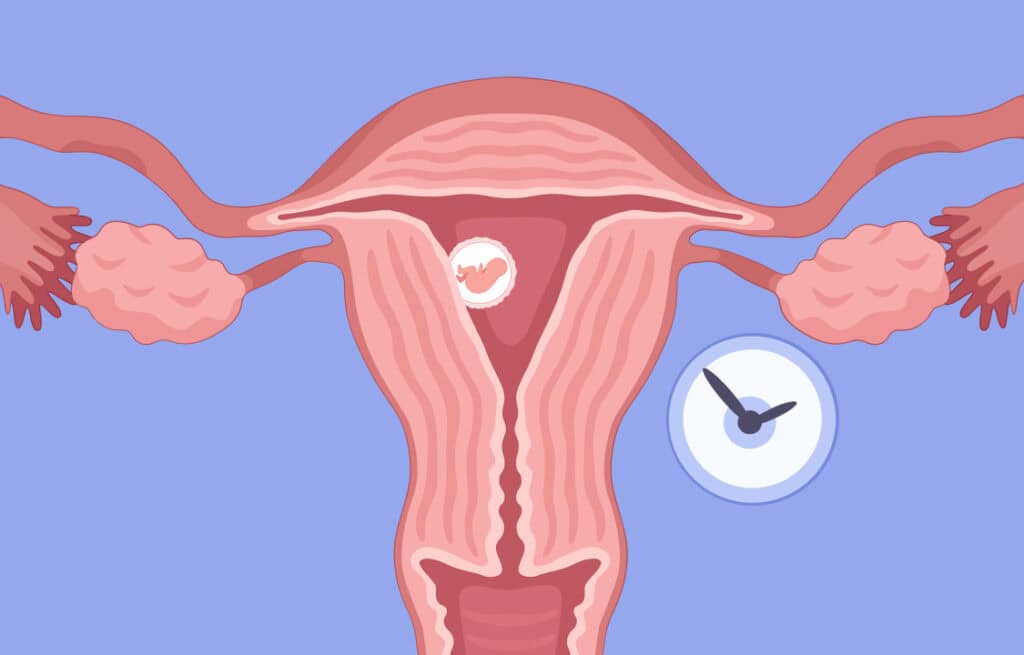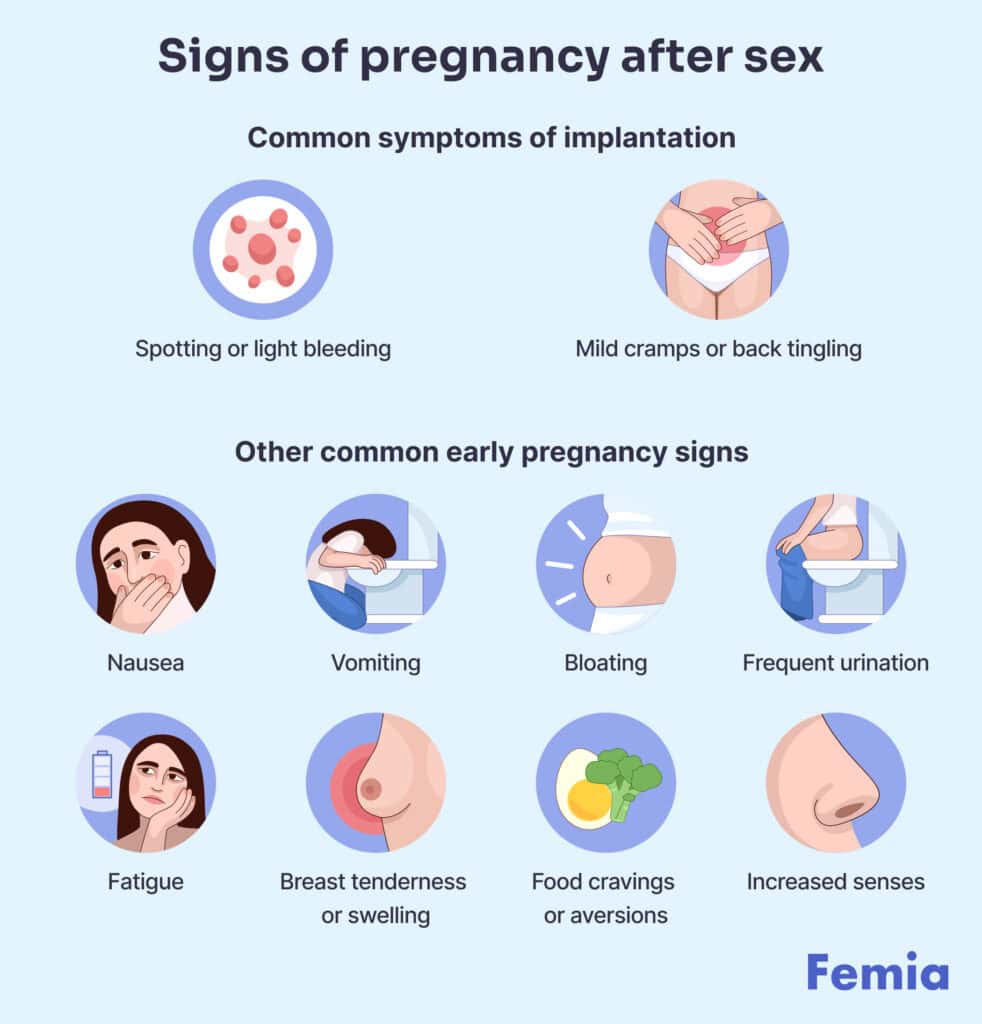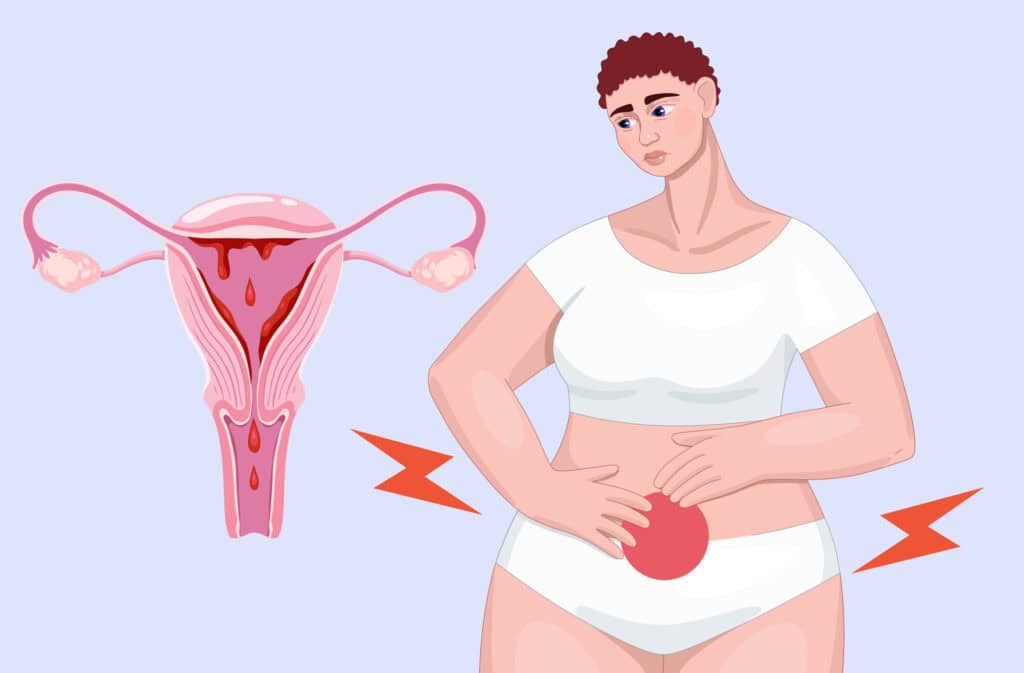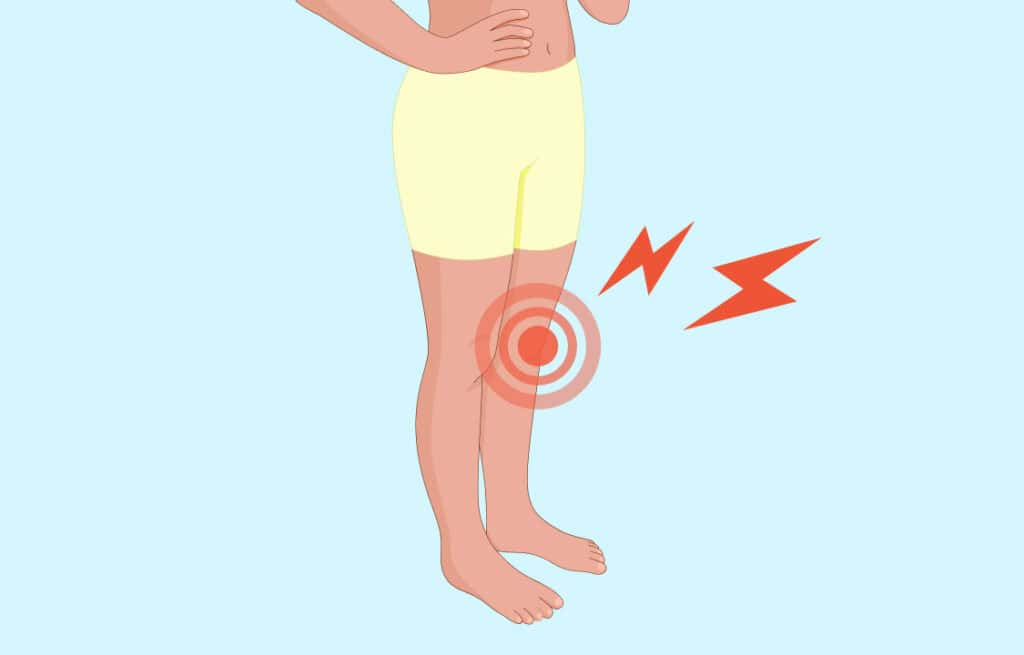Femia > Health Library > Getting Pregnant > Planning pregnancy > How long does it take to get pregnant after sex: Understanding the timeline
How long does it take to get pregnant after sex: Understanding the timeline

- Updated Feb 10, 2025
- Published
CRAFTED BY HUMAN
Crafted by human At Femia, we provide accurate and up-to-date information at every stage of your journey, from trying to conceive, pregnancy and postnatal support. All content is created by a real person based on in-depth research and own professional experience. Femia ensures that you will receive expert advice, strict accuracy and a personalized approach from our authors/medical experts. Learn more about our editorial policy.
FACT CHECKED
Fact checked At Femia Health, we maintain the highest standards of editorial excellence in delivering content focused on helping you conceive, guiding you through pregnancy, and supporting you postpartum. Explore our content review principles to learn how we ensure the accuracy and quality of our health and lifestyle tips for every stage of your journey.
Whether you had sex during your fertile window or specifically on the day of ovulation, pregnancy doesn’t occur instantly and can take around 2-3 weeks to start. The sperm in your reproductive tract remains viable for up to 5 days and gets fertilized within 12-24 hours of ovulation. Then, a fertilized egg moves down to your uterus, and implantation happens around 6-12 days after fertilization (ovulation). That’s the point when pregnancy begins officially. Though it’s not common, the first signs of pregnancy after sex can occur 5-6 days later.
How fast can you get pregnant after sex? Probably every woman on their TTC (trying to conceive) journey has asked this question. The reality is that pregnancy doesn’t happen immediately after sex. It takes a number of events leading up to it, such as:
- Intercourse during your fertile window
- Ovulation
- Sperm union with the egg (fertilization)
- Implantation
The speed of these events depends on individual health and lifestyle factors and the timing of ovulation, as well as your partner’s sperm health. In this guide, we’ll walk you through the conception process step by step to help you understand what’s going on in your body after sex and how long you might have to wait to get pregnant.
Femia helped 35,000 couples to optimize their fertility
How long does it take to get pregnant after sex?
Fertilization and pregnancy don’t happen immediately after sex and are closely linked to your ovulation timing. One occasion you may face is a rather fast fertilization. It can happen if you have intercourse right during your ovulation. In this case, your egg and sperm may meet at the beginning of the fallopian tube and the estimated time for this to happen can be around 45 minutes (or slightly faster). One of the primary factors affecting the ability to have your egg fertilized so fast is your partner’s sperm health and motility–only the healthiest sperm cells can reach the egg and “break the eggshell” to get in and fertilize it. However, not all fertilization attempts happen this fast.
Another possible occasion is when you actively have sex during your fertile window. Once inside your reproductive tract, sperm can remain viable for up to five days and meet the egg later.
Hence, it’s technically possible to get pregnant five days after your intercourse. However, though your fertile window should typically be the five days before ovulation plus the day of ovulation, the three days before, and the day of ovulation are considered the most fertile ones. So if you’re trying to conceive, you may want to have sex during this time for the best chance of getting pregnant.
👉Find out more: How long after sex does implantation occur: Understanding the timeline
How long does conception take after sex?
In order to improve the likelihood of conception, it helps to understand your fertile window and the timeline of events that occur before, during, and after fertilization.
Let’s break down the process into stages:
Fertile window and sex
A fertile window is the interval of time when you’re most fertile. It depends on the length of your cycle and ovulation timing. For example, if you have a 28-day cycle and ovulate on day 14, your fertile window would be between days 11 and 14. Having sex during this time increases the likelihood of conception.
👉Find out more: How do I know if I am fertile enough to get pregnant? Key signs and tips
Ovulation and fertilization
When your ovaries release a mature egg, it remains available for fertilization for about 12-24 hours as it slowly moves down the fallopian tube. If sperm reaches the egg during this time, it can get fertilized and continue moving to the uterus to implant.
Implantation
When a fertilized egg reaches the uterus, it needs to attach to the lining to continue developing. This process is called implantation. It typically takes place 6-12 days after ovulation and marks the start of the pregnancy.
Based on these stages, we can say that the average time between intercourse and pregnancy is typically 2-3 weeks.
How many days after sex can you get pregnant?
The egg is fertilized during the time of ovulation. Typically, this happens 12-24 hours after the mature egg is released by your ovaries. Nevertheless, this doesn’t necessarily mean that you will only need up to 24 hours to get pregnant.
In practice, the speed of fertilization depends on a whole range of factors, including:
- Your age
- Past pregnancy history
- The timing and frequency of sex relative to ovulation
- Nutrition and body weight
- Other lifestyle details
All in all, pregnancy can occur from just under an hour to up to 5 days after you’ve had your intercourse (while sperm is still viable).
@femia.fertility Have you ever wondered if you can determine if you're pregnant immediately after baby dance? It's not that simple, so it is better to use Femia to understand at what stage of the new life creation you are. ✨ Link in the bio!✨ #pregnancy #pregnancysymptoms #pregnancytest #ttc #ttccommunity #dreambaby #momtobe #education #learnontiktok #implantation ♬ original sound - Femia fertility app
How long does fertilization take?
The fertilization of the egg only occurs during ovulation. When a mature egg is released from the ovaries, it is available for fertilization for about 12-24 hours, until it is reabsorbed into your body if not fertilized.
If you had sex before or during ovulation and sperm got into your reproductive tract, there is a chance of fertilization.
Although men may produce between 2 to 5 milliliters during every ejaculation and each milliliter may contain anywhere from 20 to 300 million sperm cells, it only takes a single cell to fertilize an egg.
However, the contact between the egg and sperm is random, which is why an egg and sperm can connect as quickly as 30 minutes or it may take much longer for fertilization to happen.
How many days after unprotected sex does implantation occur?
The implantation process typically takes place around 6-12 days after fertilization (ovulation). For implantation to happen, a fertilized egg must travel all the way to your uterus via the fallopian tubes and attach to the uterine lining. This process also doesn’t happen overnight. Typically, it can take anywhere between 3 to 9 days to occur so it’s nearly impossible to tell for sure when it takes place.
After implantation occurs, your body will start releasing pregnancy hormones to support fetus development and that’s when pregnancy begins officially.
Minimum how many days to get pregnant after sex?
The timing between intercourse and pregnancy can be affected by multiple factors, including your ovulation time, fertility, and your partner’s sperm count and motility. Under optimal conditions–when you had sex just before or right during your ovulation–the released egg might be fertilized within hours. Nevertheless, implantation, which marks the beginning of pregnancy, still happens several days later.
Symptoms of pregnancy after sex
Noticing early pregnancy symptoms isn’t common. On average pregnancy recognition happens around 5.5 weeks into gestation, whereas parents of only about 1.9% of US infants recognize pregnancy as early as during the implantation stage.
Still, every conception and pregnancy journey is unique and it is possible to notice early symptoms of pregnancy after sex, such as:
Light cramping
When a fertilized egg attaches to the lining (implants), some females may experience mild cramps and abdominal tenderness.
Implantation bleeding
A small amount of spotting or bleeding might accompany the implantation process. Typically, implantation bleeding occurs around 10-14 days after conception and is rather common.
Tender breasts
The hormonal changes that take place after implantation can make your breasts swollen and tender.
👉Find out more: 10 weird pregnancy symptoms you didn’t know existed
Signs of pregnancy after sex

From ovulation to around 6 days down the road it is still too early to tell if you’re pregnant or to recognize any tangible symptoms. Yet, you may start noticing signs of pregnancy after sex when a fertilized egg has already implanted.
Common symptoms of implantation that you may notice include:
- Spotting or light bleeding that takes place 1-2 weeks after fertilization.
- Mild cramping, light pulling, or tingling sensations in the lower abdomen or back area.
Other common early pregnancy signs may include:
- Nausea
- Vomiting
- Breast tenderness or swelling
- Frequent urination
- Fatigue
- Bloating
- Food cravings or aversions
- Increased senses
Femia helped 35,000 couples to optimize their fertility
Questions from the Femia community
What factors affect how long it takes to conceive?
The time you’ll need to conceive can be affected by several individual factors. First of all, it’s the timing of your ovulation because successful conception is possible from about five days before ovulation and during it (aka during your fertile window). Your fertility and your partner’s sperm health may also affect the time you’ll need to get pregnant.
Can I feel when implantation happens?
Most females don’t feel anything when implantation occurs. However, some women report having symptoms that resemble the start of their periods, such as mild cramping, lower back pain, and spotting.
Does having sex multiple times increase the chance of pregnancy?
Having sex frequently, particularly during your fertile window, can increase the likelihood of pregnancy. However, the amount of sex you have typically doesn’t speed the conception process itself.
The bottom line
When you’re on your TTC journey, we bet that you can’t wait to get the awaited big fat positive on your test. Yet, the truth is that pregnancy doesn’t happen instantly and takes a whole range of events leading up to it, meaning that you should stay patient, track your ovulation, and deepen your understanding of your reproductive processes to know what to expect.
So how long does it take to conceive after sex? Now that you know how fertilization and implantation take place, you should remember that pregnancy can take 2-3 weeks to begin officially. The conception timing is individual and affected by a number of factors, and the best way to boost your chances of pregnancy is to track your ovulation and use your fertile window to try to conceive.
References
- Le Hong Lien. “How and for how long does conception take place?” VinMec. https://www.vinmec.com/eng/article/how-and-for-how-long-does-conception-take-place-en#:~:text=The%20fastest%20time%20when%20the,is%20released%20to%20be%20fertilized.
- Patricio C. Gargollo. “How long do sperm live after ejaculation?” Mayo Clinic, 5, May, 2022. https://www.mayoclinic.org/healthy-lifestyle/getting-pregnant/expert-answers/pregnancy/faq-20058504#:~:text=Ejaculated%20sperm%20remain%20viable%20for,decades%20when%20semen%20is%20frozen.
- “Right time for sex.” Your Fertility, The Fertility Society of Australia, 28, Aug. 2018. https://www.yourfertility.org.au/everyone/timing.
- “Understanding ovulation and the fertile window.” Your Fertility, The Fertility Society of Australia. https://www.fertilitysociety.com.au/wp-content/uploads/Understanding-ovulation-and-the-fertile-window.pdf.
- “Conception Factors.” Northern Arizona University. https://www2.nau.edu/gaud/bio301/content/cncptfct.htm.
- “Sperm counts.” The Open University, 1, Aug. 2023. https://www.open.edu/openlearn/nature-environment/natural-history/sperm-counts#:~:text=The%20quantity%20of%20sperm%20cells,to%20300%20million%20sperm%20cells.
- “Understanding Implantation Symptoms.” Nova IVF. https://www.novaivffertility.com/fertility-help/implantation-symptoms.
- Watson K, Angelotta C. “The frequency of pregnancy recognition across the gestational spectrum and its consequences in the United States.” Perspect Sex Reprod Health, Jun. 2022. https://www.ncbi.nlm.nih.gov/pmc/articles/PMC9321827/.
- Mary Marnach. “Is implantation bleeding common in early pregnancy?” Mayo Clinic, 19, Apr. 2022. https://www.mayoclinic.org/healthy-lifestyle/pregnancy-week-by-week/expert-answers/implantation-bleeding/faq-20058257#:~:text=Implantation%20bleeding%20is%20defined%20as,the%20lining%20of%20the%20uterus.
- Lowri Daniels, Valinda Riggins Nwadike. “Implantation symptoms: Signs, timeline, and testing.” Medical News Today, 26, Jun. 2023. https://www.medicalnewstoday.com/articles/implantation-symptoms.

Discover why you might feel nauseous after sex. Learn about common causes of post-sex nausea and lower abdominal pain. Expert advice from Femia.

Learn the crucial differences between period vs miscarriage bleeding. Understand symptoms, timing, and how to distinguish early miscarriage vs period. Expert guidance from Femia.

Explore an in-depth guide of the symptoms, causes, treatment, prevention, supplements, and natural remedies for menopause joint pain.

